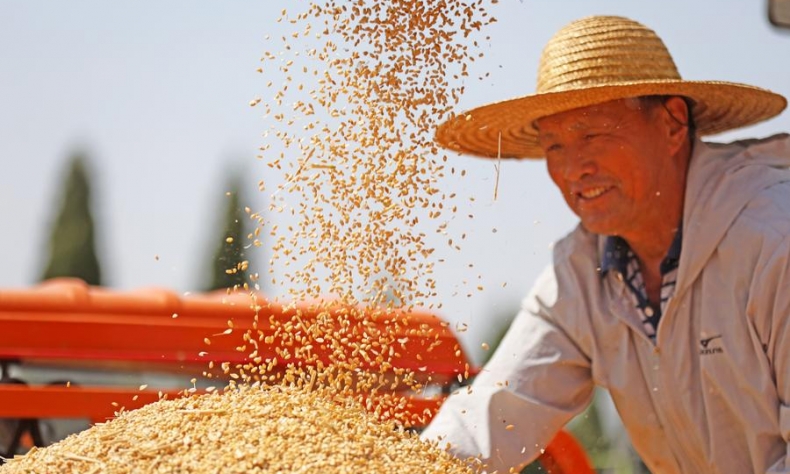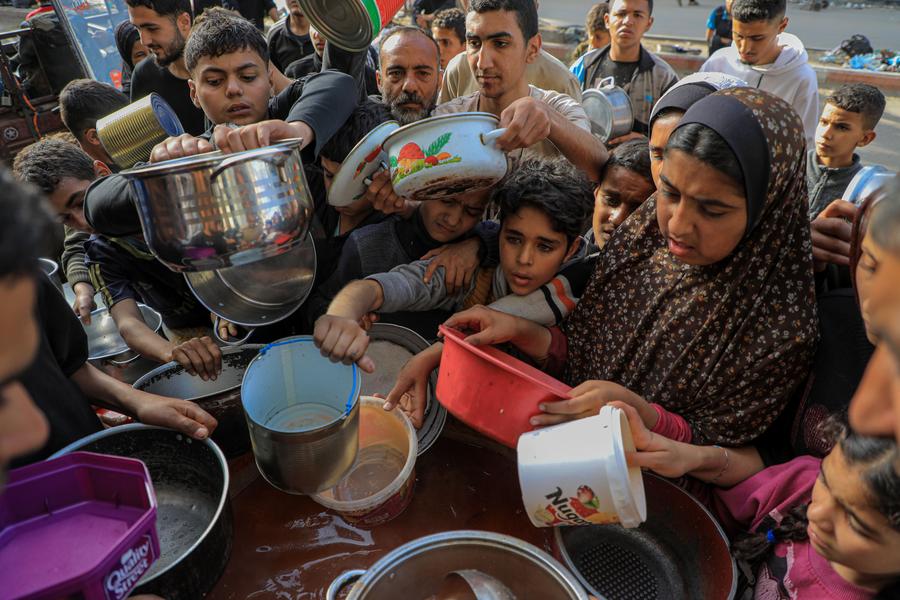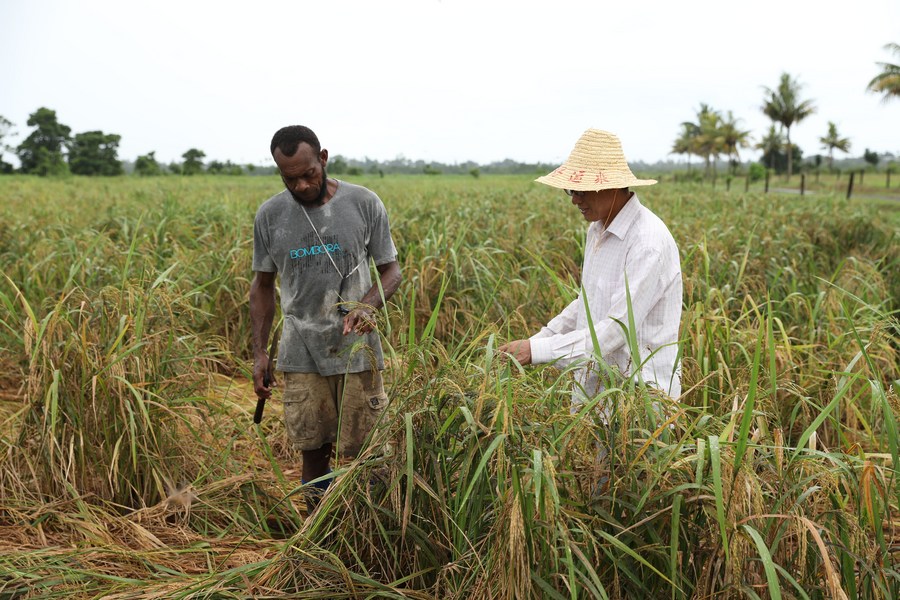A Sustainable Table

Through continued collaboration, innovation and mutual support, China and its partners are paving the way for a future where food security and sustainable development are within reach for all.
In a world undergoing profound transformations, food security stands as a cornerstone of peace and development—a vital foundation for building a community with a shared future for humanity.
Against this backdrop, China has deepened its partnerships with countries across the Global South and engaged in global food security governance.
(The Global South refers to the nations of the world that are considered to have a relatively low level of economic and industrial development, and are typically located to the south of more industrialized nations—Ed.)
By advancing its Global Development Initiative (GDI), which was put forward by President Xi Jinping in 2021 and calls for steering global development toward a new stage of balanced, coordinated and inclusive growth, and fostering cooperation, China has become essential in the collective effort to ensure global food security.
Stabilizer in a volatile world
In recent years, global food security has faced challenges stemming from trade disputes and supply chain disruptions, among others. These factors have contributed to a more unstable and risky global agricultural market.
Currently, a limited number of countries produce and export the majority of the world’s food, while many others depend on imports to meet their needs. This reliance creates an imbalance that makes the global food supply vulnerable to geopolitical tensions, heightening the risk of food insecurity.
The ongoing conflicts between Ukraine and Russia, as well as between Israel and Palestine, have severely disrupted global food supply chains. These disruptions have triggered a wave of food protectionism, where nations increasingly wield food as a political tool.
As the political foundation for international cooperation on food security erodes, global food insecurity worsens. According to the 2024 United Nations report on the State of Food Security and Nutrition in the World, the situation has regressed by 15 years, with levels of undernourishment now comparable to those seen in 2008-09.

Since joining the World Trade Organization (WTO) in 2001, China has actively engaged in agricultural negotiations to reform unfair trade practices. The country strongly supports a WTO-centered multilateral trading system and hosts numerous international agricultural trade expos and fairs each year. China is now one of the countries with the lowest agricultural tariffs, contributing to the stabilization of global food markets and the strengthening of agricultural supply chains.
Furthermore, China is advocating for reforms in the global food security governance system and is enhancing the role of the UN Food and Agriculture Organization (FAO) in this arena. The country has increased its donations to the FAO and supports its collaboration with the Group of 20 (G20) and other international platforms to launch and implement food security programs and initiatives.
Additionally, China has established a UN global humanitarian response depot and hub and has assisted the UN World Food Programme in creating a Center of Excellence in China. This initiative aims to foster agricultural cooperation projects with developing countries.
Starting December 1, 2024, China now grants zero-tariff treatment to all tax lines from the least developed countries (LDCs) that have established diplomatic relations with it, including 33 African nations.
This policy is expected to enhance these countries’ access to Chinese markets and improve their food security.
Agricultural modernization
Food security remains a pressing challenge for many Global South countries. With large agricultural populations and economies that rely heavily on farming, these nations are among the most vulnerable to food insecurity.
According to the abovementioned 2024 UN report, around 733 million people faced hunger worldwide in the previous year, with the vast majority residing in the Global South.
As a key member of the Global South, China has been collaborating with other developing nations to modernize their agriculture and boost food production so as to strengthen global food security.
The country has consistently advocated for development-focused agendas within multilateral platforms to support inclusive and sustainable global growth. Notably, during the G20 Hangzhou Summit in 2016, China placed development at the center of the G20’s macroeconomic policy coordination for the first time. The summit went on to adopt the G20 Action Plan on the 2030 Agenda for Sustainable Development and the G20 Initiative on Supporting Industrialization in Africa and the LDCs.

At the 19th G20 Summit last November, held in Rio de Janeiro, Brazil, China called for building a just world of common development, where fighting hunger and poverty is placed at the top of the agenda. The country also decided to join the Global Alliance Against Hunger and Poverty, an approach to accelerate efforts to implement the UN Sustainable Development Goals (a set of 17 interconnected global goals established by the UN in 2015 as part of the 2030 Agenda for Sustainable Development—Ed.).
At the 2021 UN General Assembly, China introduced its GDI. This initiative has since catalyzed meaningful global partnerships. In collaboration with the UN, China has released 50 cooperation projects of GDI project pool in areas of food security, poverty reduction and industrialization.
China’s commitment in its partnership with Africa is evident. As a major partner in the continent’s efforts to secure food supply, China unveiled the Plan for China Supporting Africa’s Agricultural Modernization during the China-Africa Leaders’ Dialogue in South Africa in 2023. At the 2024 Forum on China-Africa Cooperation Beijing Summit, China introduced the partnership initiative for rural revitalization and the people’s wellbeing, outlining a series of targeted measures.
China’s agricultural cooperation efforts extend beyond Africa to Eurasia. China established the Shanghai Cooperation Organization Agricultural Technology Exchange and Training Demonstration Base. By partnering with over 60 countries, China has shared cutting-edge agricultural technologies, introduced new crop varieties and promoted innovative farming practices.
In its collaboration with Arab countries through the China-Arab States Cooperation Forum, China introduced Eight Joint Actions to strengthen agricultural partnerships. These include building five modern agricultural joint laboratories, launching 50 agricultural technology cooperation demonstration projects and dispatching 500 agricultural experts to support agricultural innovation across Arab nations.
China’s agricultural engagement in Latin America and the Caribbean has also grown steadily. The nation has established bilateral agricultural cooperation mechanisms with 19 countries in the Community of Latin American and Caribbean States (CELAC). At the third China–CELAC Ministerial Forum on Agriculture in 2024, two landmark agreements were announced: the China–CELAC Ministerial Consensus on Agricultural Priority Areas and the Action Plan on Strengthening China–CELAC Agricultural Cooperation. These strategic frameworks set clear directions for future collaboration on sustainable agricultural development and technology transfer.
Through continued collaboration, innovation and mutual support, China and its partners are paving the way for a future where food security and sustainable development are within reach for all.
The author is an assistant research fellow at the Department for International and Strategic Studies, China Institute of International Studies.
 Facebook
Facebook
 Twitter
Twitter
 Linkedin
Linkedin
 Google +
Google +










